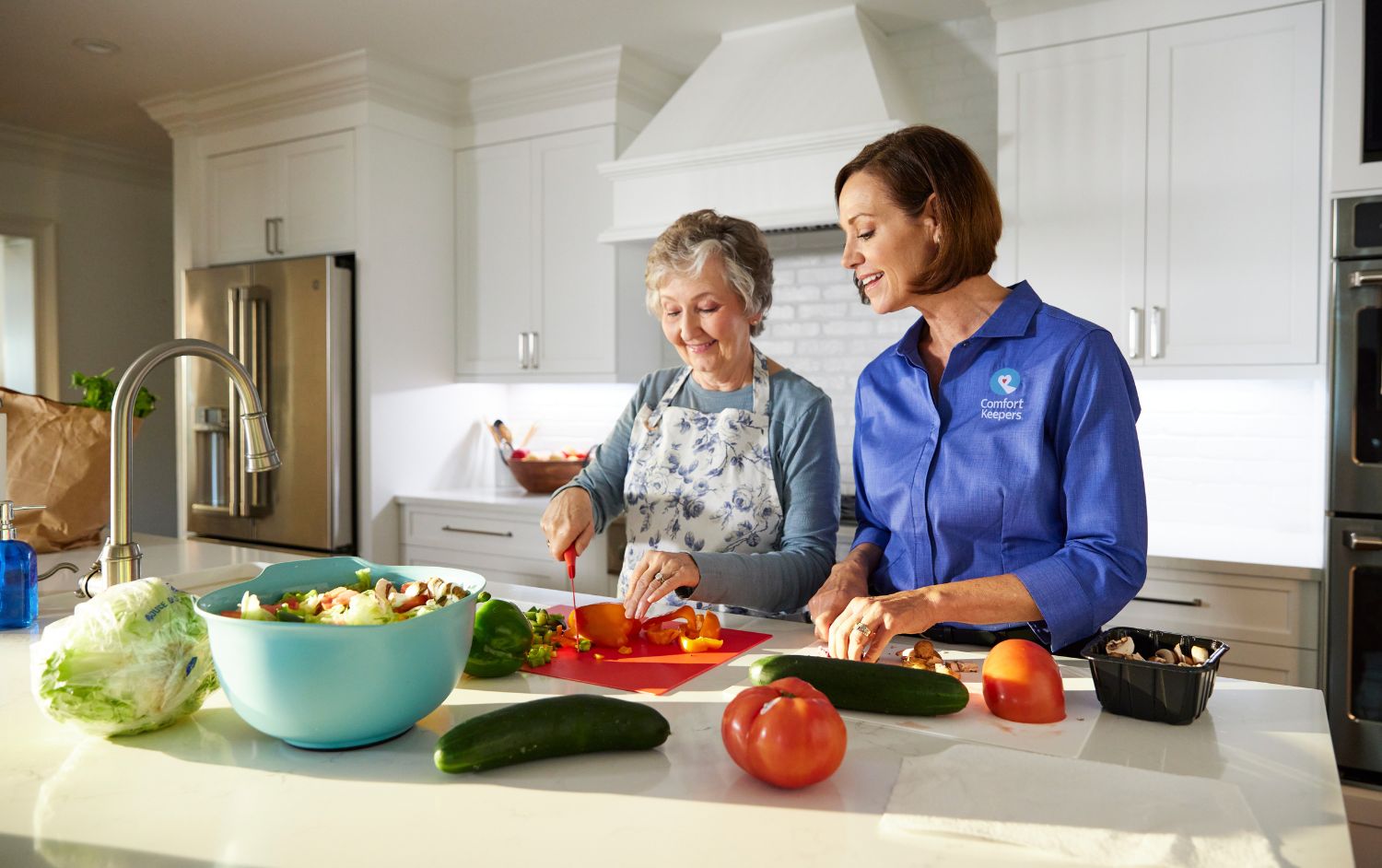How Loneliness Affects Senior Health: More Than Just Feeling Sad
TriCities Senior Homecare | September 10, 2025
We often think of health in terms of diet, exercise, and check-ups. We track blood pressure and cholesterol, but we rarely measure connection. Yet, a growing body of research reveals that one of the most significant threats to a senior’s health might not be found in a blood test, but in the silence of an empty home.
You may have noticed a parent or loved one seeming more withdrawn. Perhaps they dismiss it as “just feeling a bit down,” but that feeling, known as loneliness, is far more than just sadness. The World Health Organization (WHO) has highlighted a startling fact: the health impact of chronic loneliness can be equivalent to smoking 15 cigarettes a day.
This isn’t an exaggeration. It’s a serious medical red flag. Understanding why loneliness is such a powerful threat is the first step toward protecting the people we care about.
The Difference Between Being Alone and Being Lonely
Before we dive deeper, it’s crucial to understand a key distinction. The terms “social isolation” and “loneliness” are often used interchangeably, but they mean very different things.
- Social Isolation is an objective state. It’s the physical reality of having few social connections or infrequent contact with others. Someone who lives alone, has lost a spouse, or can no longer drive may be socially isolated.
- Loneliness is a subjective feeling. It’s the emotional pain of feeling disconnected, misunderstood, or that you lack meaningful relationships, regardless of how many people are around you.
An introverted senior might be socially isolated but feel perfectly content. Conversely, someone living in a busy household or retirement community can feel intensely lonely if their connections lack depth and meaning. This distinction is vital because it shows that simply filling a room with people isn’t the cure. The solution lies in fostering genuine, quality connection.
The Hidden Health Crisis: How Loneliness Physically Harms the Body
So how does a feeling – loneliness – cause tangible, physical harm? It happens through a cascade of biological responses that quietly wear the body down over time. Think of it as a silent alarm that never turns off.
#1. The Constant ‘Alarm Bell’: Chronic Stress and Inflammation
For our ancestors, the stress response (“fight or flight”) was a survival tool for escaping immediate physical danger. For a lonely senior, that same biological alarm can be triggered by the chronic threat of isolation.
This sustained stress floods the body with the hormone cortisol. While useful in short bursts, high cortisol levels over months or years lead to chronic inflammation. Researchers now link this inflammation to a host of age-related diseases. According to the CDC, prolonged loneliness significantly increases a person’s risk of:
- Heart disease by 29%
- Stroke by 32%
- Type 2 diabetes, arthritis, and other inflammatory conditions
#2. A Weakened Defence System
That same chronic stress response also weakens the immune system. The body becomes less effective at fighting off viruses and infections, which is why a lonely senior might seem to catch every cold that goes around or take longer to recover from illness.
#3. Impact on the Brain
The brain is not immune to the effects of isolation. Studies from the National Institute on Aging (NIA) show a compelling link between loneliness and cognitive decline. Socially isolated seniors have a 50% increased risk of developing dementia. Meaningful social engagement acts as a workout for the brain, while loneliness allows those cognitive “muscles” to atrophy. For those already facing memory challenges, isolation can accelerate the progression of conditions like Alzheimer’s, making specialized dementia care that includes social engagement even more critical.
#4. A Vicious Cycle of Behaviour
Loneliness changes behavior in ways that worsen health. A person feeling disconnected may think, “What’s the point of cooking a healthy meal for one?” This can lead to poor nutrition and unintended weight loss. They may sleep poorly, avoid exercise, and be less likely to manage their medications properly. This creates a downward spiral where loneliness and poor physical health feed each other. Ensuring proper senior nutrition and encouraging light activity are key interventions.
Common Myths About Loneliness in Seniors (and Why They’re Wrong)
Understanding the issue also means unlearning a few common misconceptions that can prevent us from seeing the problem clearly.
Myth 1: “It’s just a normal part of getting older.”
While life changes like retirement, loss of a spouse, and decreased mobility are more common in later life, loneliness is not a normal or acceptable part of aging. It is a treatable condition with serious consequences.
Myth 2: “My parent has family and visitors, so they can’t be lonely.”
As we’ve seen, loneliness is about the quality, not the quantity, of relationships. A senior can be surrounded by caring family but feel lonely if they believe they are a burden or if the conversations remain superficial.
Myth 3: “They say they’re fine, so I shouldn’t push it.”
Many older adults grew up in generations where discussing feelings was discouraged. Admitting to loneliness can feel like a sign of weakness or a complaint. They may say “I’m fine” to avoid worrying you, even when they are struggling internally.

A Practical Toolkit for Fostering Connection
Addressing loneliness doesn’t require a grand gesture. It starts with small, consistent actions that rebuild a sense of belonging and purpose. The goal isn’t just to fill time, but to provide meaningful companionship care that nourishes the spirit.
#1. Start with an Empathetic Conversation
Instead of asking “Are you lonely?” (which can feel accusatory), try open-ended questions:
- “I’ve been thinking about you. How have you been feeling lately?”
- “It seems like things have been quiet around here. What’s been on your mind?”
- “I miss hearing about [a hobby they used to enjoy]. Have you had any time for that?”
#2. Reconnect with a Sense of Purpose
Loneliness often stems from a feeling of no longer being needed. Help your loved one find purpose by:
- Asking for their advice: Tap into their lifetime of experience.
- Giving them a role: A simple task like folding laundry or helping with a recipe can restore a sense of contribution.
- Exploring volunteer opportunities: Many organizations need volunteers who can help from home, like making phone calls or knitting blankets.
#3. Focus on Quality Activities
It’s not about being busy; it’s about being engaged.
- Share an experience: Instead of just sitting together watching TV, try listening to their favorite music, looking through old photo albums, or working on a puzzle together.
- Get outside: Even a short walk or sitting on a park bench can do wonders for mental and physical health.
- Schedule “do-nothing” time: Just being present without an agenda can be the most powerful form of connection.
Frequently Asked Questions (FAQ)
Q: Can loneliness really be as bad for your health as smoking?
A: Yes. Major health bodies like the WHO and CDC have confirmed this based on large-scale studies. The chronic stress, inflammation, and behavioral changes caused by loneliness create a level of physiological damage comparable to that from smoking 15 cigarettes daily.
Q: How do I help an introverted senior who genuinely prefers being alone?
A: Respect their nature. The goal isn’t to turn an introvert into an extrovert. For them, one or two deep, meaningful connections are far more valuable than a large social group. Focus on quality, one-on-one time. A weekly phone call or a quiet visit can be enough to stave off loneliness without feeling overwhelming.
Q: What are the most common risk factors for social isolation?
A: Key risk factors include living alone, the recent loss of a spouse or close friends, hearing or vision loss that makes communication difficult, and lack of access to transportation.
Q: What if my loved one needs more help than I can provide?
A: Recognizing you can’t do it all is a sign of strength, not failure. Juggling your own responsibilities with caregiving is incredibly challenging. Professional in-home care can provide a crucial support system, offering everything from companionship to help with daily tasks. If you’re unsure where to start, a free in-home consultation with Comfort Keepers Tri-Cities can help you understand the options available.
Connection is the Best Medicine
Protecting the health of the seniors we love goes beyond medicine and physical safety. It requires tending to their emotional and social well-being with the same urgency.
Loneliness is not a personal failing or an irreversible part of aging; it is a treatable health condition. By understanding its profound impact and taking small, consistent steps to foster connection, you can give your loved one the most powerful medicine of all: the knowledge that they are not alone.
The Best, Expert Senior Home Care in Tri-Cities, British Columbia is Comfort Keepers® Coquitlam
At Comfort Keepers®, we provide personalized, compassionate in-home care services for seniors in Tri-Cities of Coquitlam, Port Coquitlam (PoCo), Port Moody, Anmore, and Belcarra, BC.
We proudly support thousands of families each year with home health care services—helping loved ones remain safe, happy, and independent in the homes they love.
Elderly Care at Home: Home is The Best Place to Be
Providing care for an aging parent or loved one can be both fulfilling and incredibly demanding, especially for family members balancing careers and busy households. That’s where we come in.
Comfort Keepers® Tri-Cities offers professional, flexible care solutions that lighten the load for families and give everyone peace of mind—knowing their loved one is in good hands.
We offer a range of services that include companionship care for seniors, personal care services, non-medical homecare and Tri-Cities respite care.
Comfort Keepers® Tri-Cities Can Help with Companion Care and Interactive Caregiving™
At Comfort Keepers® Coquitlam, we believe in more than just meeting physical needs. The team at Comfort Keepers® elevates the human spirit. Trained caregivers build meaningful relationships, bring joy into everyday moments, and provide support that goes beyond routine care.
Our senior homecare caregivers help provide our elderly clients with personal home care to help maintain the highest possible quality of life. Caregivers deliver Interactive Caregiving™, a system of care that addresses safety, nutrition, mind, body, and activities of daily living (ADLs).
Comfort Keepers® Tri-Cities Provides Home Care and a Wide Range of In-Home Care Services for Seniors.
Are you looking for reliable home care in the Tri-Cities of Coquitlam, Port Coquitlam (PoCo), Port Moody, Anmore, and Belcarra?
Learn more about our unique service, which offers personal care, companionship care, palliative and end-of-life care.
Contact the Comfort Keepers® Tri-Cities office today to schedule a free in-home consultation. Let us show you how our care can make a meaningful difference in your loved one’s life.
Individualized Home Care Options
Long-Term Home Care, 24 Hour Home Care & Short Term Care Options Customized for You






